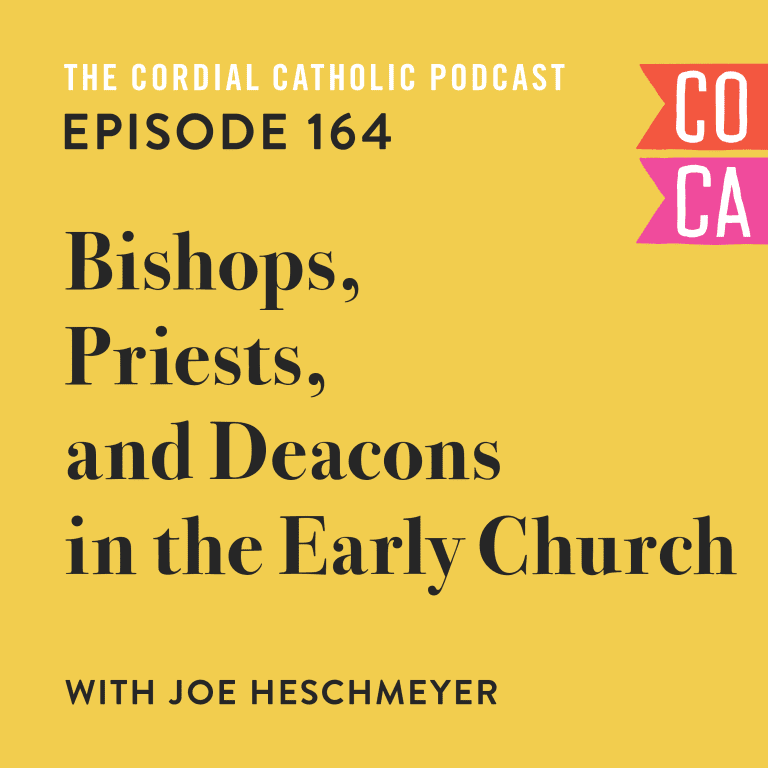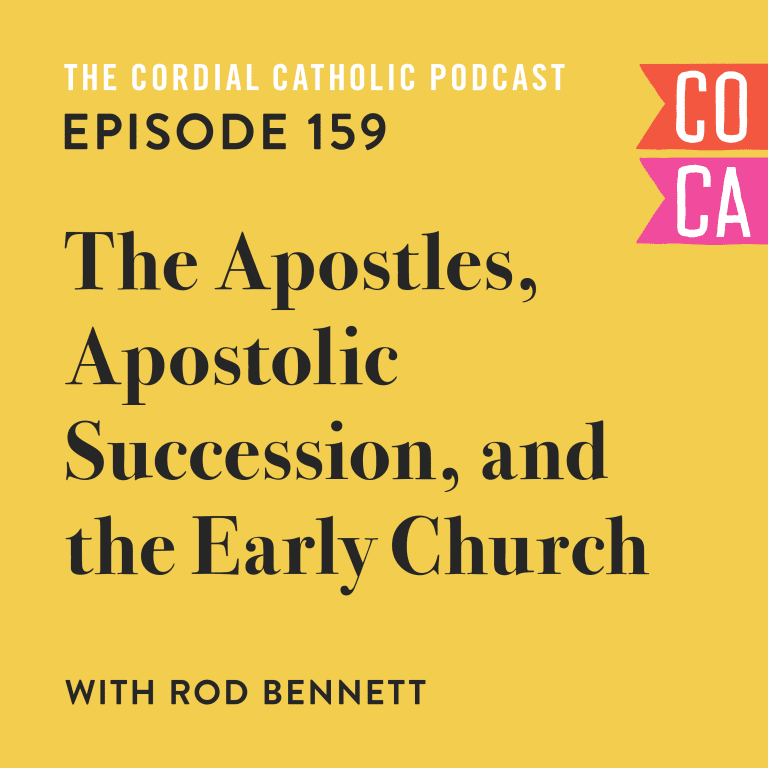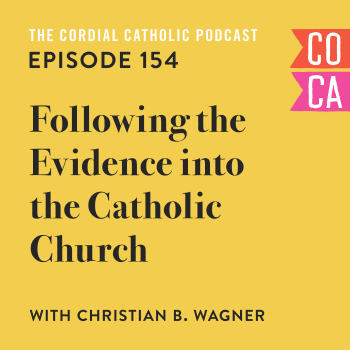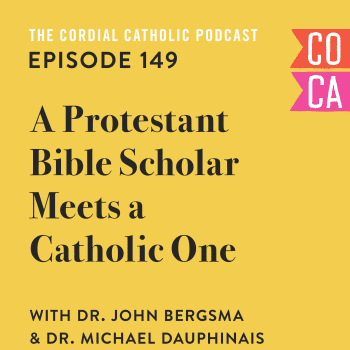
This week on the podcast I was privileged to speak to Bishop Thomas Dowd of the Archdiocese of Montreal, Canada. It was an interview I’d been looking forward to on a topic that has prompted lots of listener feedback: Apostolic Succession.
Apostolic Succession? It would’ve have even been in my vocabulary as a Evangelical but its importance to Catholicism, and historic Christianity, cannot be overstated.
Maybe you’ve heard this before: the Early Church was made up of groups of Christians, living and worshipping in secrecy, bound together by nothing more than their shared faith in Christ.
No hierarchy, no rules or rituals, just a simple life in common, in Christ.
This was the Church of the Apostles.
(Which later became corrupted.)
This was the simple faith that I, as an Evangelical Christian, thought I was living out.
Of course, in many ways, my Evangelical Christianity looked nothing like that of the apostles; looked nothing like the faith life of those very early Christians we see pictured in Acts. We met in well-lit churches, in public with no fear of persecution, in temples adorned with technology, electric guitars and mediocre coffee and donuts after service. We met with a big bombastic band up front, with forty-five minute sermons from the pastor, with a Bible, a collection of books and letters bound between two covers.
The apostles had none of this.
But when I began digging into the history of Christianity and the roots of my faith I discovered that it wasn’t only these surface level differences that existed between my church and the churches of the apostles—the differences were foundational.
Extraordinary.
Prompted by a question an Evangelical pastor asked me, I started looking into the historical Christian church. As an undergrad History Major, I thought I knew something of what the Early Church looked like, how they organized themselves, and how they worshipped but as I started turning over stones and pouring over the pages of history I quickly realized that most of my understanding of Early Church history had come from adult education classes at my Evangelical church or small group studies.
And, as it turns out, they weren’t always historically faithful.
For example, my impression of the first Christians as a loosely organized group of believers spreading the faith in a kind of unorganized wildfire came, most certainly, from the book of Acts. There’s certainly some truth to this, to the organic spread of the Gospel in those early days, but I missed something entirely.
Also in Acts is the clear leadership role taken by Peter. And, even earlier in the story of the Early Church, the consecration of Matthias to replace the disgraced, deceased, Judas. A succession of leadership: when one apostle dies, another takes his place.
Yes, the Early Church was spreading the Gospel like wildfire but they were also appointing leaders, and respecting leadership, in a coherent and orderly fashion.
I completely missed this in my reading as an Evangelical.
A reading of what are known as the Early Church Fathers, leaders of the church that followed the first apostles appointed by Christ, provides an even starker picture when compared to my Evangelical experience.
There is, in fact, a wealth of examples of the leadership office of the apostles being passed on, and of its importance in organizing the Early Church but I’ll pick one of the earliest to illustrate the point.
Ignatius of Antioch was a disciple of John and lived around AD 35 to 107. He himself was, in succession, the third bishop of Antioch and wrote this about the importance of bishops in his Letter to the Smyrnaeans,
See that you all follow the bishop, even as Jesus Christ does the Father, and the presbytery as you would the apostles; and reverence the deacons, as being the institution of God. Let no man do anything connected with the Church without the bishop. Let that be deemed a proper Eucharist, which is administered either by the bishop, or by one to whom he has entrusted it. Wherever the bishop shall appear, there let the multitude of the people also be; even as wherever Jesus Christ is, there is the Catholic Church.
That the earliest Christians saw the apostles as the Church’s first leadership team is incontestable. That those same apostles, when they died, passed on their authority is also a matter of historical fact.
In fact, how those early Christians identified “the Church” was by looking for the bishop celebrating the Eucharist.
An authority structure, passed on in succession, guided the church even in those earliest days.
The beautiful old hymn, “They will know that we’re Christians by our love,” could be amply rewritten, “They knew who were Christians by their bishop.” Although I doubt it’d be a hit.
In fact, says Bishop Dowd, this succession of authority is exactly what the first Christians, converts from Judaism, would’ve expected.
“The consensus of the rabbis today,” says Bishop Dowd, “is that the succession of the laying on of hands [begun by Moses] was broken.”
Not only would the Messiah come to usher in the Kingdom of God, he would also re-establish the laying on of hands in line with the priestly succession of leadership which began with God appointing Moses as the first leader of the Jews. The Jews, he says, were waiting for a new leader, the Messiah, to begin a new priesthood.
Of course, says Bishop Dowd, as Christian this looks a lot like what did happen with the church Christ established.
But why do we need apostolic succession?
Even if my Evangelical church wasn’t structured like the ancient churches, what did it matter?
Here, I recall an argument I once had early on in my conversion to Catholicism.
After digging into the history of Christianity, reading the Early Church Fathers, and reading about the Catholic Church from actual Catholic sources I decided to begin to take tentative steps towards, of all things, becoming Catholic. It was in this context, on the doorstep of the Catholic Church, that someone asked me why.
At the time, I fumbled for an answer. It was someone I barely knew, who knew nothing of my faith history or journey, and who I didn’t have much of a rapport with. I had my reasons, but not in an elevator-speech format, and articulating them in the heat of the moment to a near stranger proved challenging.
“I guess,” I said, “because it seems to me like of all the churches I’ve ever seen, the Catholic Church looks the most like the Early Church did.”
I thought it was a decent reply.
“But,” he began, “why is older better?”
At the time I was stumped and as my conversation partner folded his arms over his chest I felt defeated.
Why was older better? So what if my evangelical church didn’t trace its lineage of authority or leadership back to the apostles? What did it matter? We had the Bible and we followed that.
Years later, I think my reply would be something like this.
Older isn’t necessarily better, I’ll grant you that. But I’m not arguing for older I’m arguing for more in line with the church that Christ began and how do we know what that church looked like? By looking at its earliest form, as it was just established.
Of course Christ intended the church to grow but to grow up around the authority, the structure, he established with the apostles. That is what’s so important about apostolic succession; and that is why its so important that the Catholic Church retains, and is founded on, this ancient principle.
The authority of apostolic succession, says Bishop Dowd, is like the bones of a skeleton. We, the faithful, are like the muscles.
Without the structure of the bones to grow up around—without an authority to teach and unpack the Gospel, to guide and govern the faithful, to make decisions on new issues of faith and morales, to delineate what we believe and what we don’t—us, the muscles, would simply wither ineffectively.
And the good Bishop is right.
As an evangelical Christian I saw church splits, theological opinions and theological counter-opinions, charismatic leaders rise and fall (and rise again) and I don’t, for a minute, think that the Catholic Church is perfect, or has it all figured out, but it has a clear, sensible, and historic lineage of authority behind it which is traceable right to Peter and the Apostles themselves.
I have seen what groups of Christians trying to interpret their Bible looks like, and it isn’t pretty.
What Christ began, with appointing his apostles, if it continues today, provides a framework in which to make those interpretations which is like the playground fence which tells the kids where its safe to play.
It makes the Christian life more discernible. And it makes a lot of sense.
In the end, I am grateful for my evangelical heritage. I learned a deep love for Scripture, for Jesus Christ, and a zeal for bringing the Kingdom of God to bear. But my church wasn’t the church of the apostles—it was hard to compare—and when I came to realize that what Christ did, two thousand years ago, continues today with the succession of the apostles I was, at first, curious.
And, as I dug deeper, as I realized that it made sense to appoint an authority with the power to tangibly forgive sins in Christ’s name, to teach faith and morals, to collect the books of the Bible together, to help Christians to navigate the ever-widening world. And as all of this came together, in much prayer, I became convinced.
To listen to my full interview with Bishop Thomas Dowd click here or listen below,











